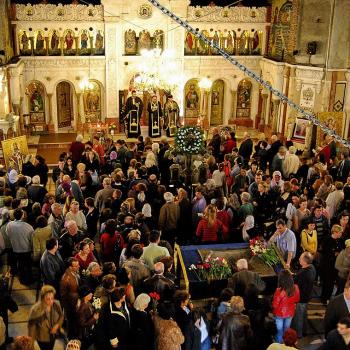
Prayer is an important part of the Christian life. There are many ways to pray, with each of us finding some more to our own personal liking than others. Some prefer communal prayer, others prefer private prayer. Some prefer petitionary prayer, others prefer contemplative prayer. Each have their place, and it is fine if we engage some kinds of prayer more than others in our lives. But it is imperative that we do more than simply pray. We must not get so caught up in the process of prayer, and in our thoughts and words, or the meditational peace we gain in contemplation, that we forget to live and act in the world in which we have been born. Prayer is a way to bring the presence of God in our lives, a way for us to commune with God, but God wants us to do more than simply sit there and do nothing. God wants us to embrace the grace which is had in prayer and to use it for the transformation of ourselves and the world around us. The the point of prayer is to bring us into communion with God so that we can join ourselves with and participate in the divine life; and as God is at work in the world, engaging the world, acting in and with the world, so we must embrace those works of God and act in unison with them ourselves:
Prayer, contemplation, holy reading lead naturally to praxis, not only the praxis of repeating a prayer- word or line of Scripture, but the practice of finding God, of being centered in all our daily life and activity. And often that activity is our work. [1]
Praxis, action, must always be a part of the Christian life. If we, like Paul, say that in and with Christ we can do all things, then it is important for us to be act so the Christ can be at work in and through us. We must embrace God’s desires for the world. We must desire holiness, however, it is impossible for us to be holy if we reject divine justice. And if it is something we want, we should act on it, doing so in and with Christ:
“Blessed are those who hunger and thirst for justice.” It does not suffice for us to want justice, if we do not experience a hunger for justice. Thus from this example we should understand that we are never sufficiently just, but it is always necessary to hunger for works of justice. [2]
Prayer connects us with God, and provides a way for us to find the presence of God in our lives; we are not to be selfish and not share what we receive from God with others. If we hunger for holiness, we will do holy works; if we love Christ, we will follow him and do what he told us to do. We will love our neighbor, being like the Good Samaritan who was able to see all those in need as being his neighbor. If we avoid holy activity, if we avoid works of charity and justice, we have yet to live out our faith; we might believe, but what good is such belief if we do not act on it? As James said, even demons believe. Yes, we cannot work out our salvation all by ourselves, which is why we must work out our salvation engaging the grace which is offered to us; we must do more than pursue sound doctrine, we must live the implications which follow that doctrine:
Neither does God accept doctrines apart from good works, nor are works, when divorced from godly doctrine, accepted by God. What does it profit a man to be an expert theologian, if he is a shameless fornicator; or to be nobly temperate, but an impious blasphemer? The knowledge of doctrines is a precious possession; there is need of a vigilant soul, since many there are who would deceive you by philosophy and vain deceit.[3]
Those who would like to use God, use the Christian faith, use Christ, thinking they can accept all the grace which is offered while resisting the transformation such grace is meant to establish in them will find that they have not properly taken hold of the grace, and so will not experience the glory which it offers. Insofar as they resist God and God’s ways, they can even be said to make war against God. “In the insolence of our sacrilegious will, we desire to distort the nature of truth and we declare war against the works of God, because these are things that lie within our power.”[4] Thus, those who try to promote a society based upon the love of money, a society which ignores the plight of the poor and instead rewards the rich with more riches, will find that they have fought against God and the riches of grace will be denied them:
And hence that sign shows not surprisingly that all those who, after a long time of recognising God’s will, disregard his authority and desire to rule themselves and serve their own lusts, are doing things in a perverse order. For just at the time when, after the plentiful watering of the word they had received, they ought already to have been producing the ripe fruits of good work, by their discorded conduct they show that they still need the thunderous voice of heavenly correction or exhortation, to teach them the first elements of the words of God. [5]
Prayer is important. We need to be able to speak to God as to what is found in our heart. We need to be able to speak about our thoughts and fears. We need to commune with God. But we are also expected to live our lives, and to do so, we must do so in light of our prayer and what we gained in our time with God. The key is to find the proper balance for our lives. To find time for prayer, but also time to act in the world, making sure that our time in the world was not given to us in vain. Prayer should transform us, making us better. And how do we know if we are becoming better? By the way we treat the world around us. Do we care for those in need? Do we protect those who are being abused? Do we protect God’s creation? If we are not doing so, we must ask ourselves, why not.
[1] GilChrist Lavigne, “Word and Work: Praying with Mind and Body,” in The Contemplative Path. Ed. E. Rozanne Elder (Kalamazoo, MI: Cistercian Publications, 1995), 41
[2] St. Jerome, Commentary on Matthew. Trans. Thomas P. Scheck (Washington, DC: CUA Press, 2008), 76.
[3] St. Cyril of Jerusalem, Procatechesis and Catechesis 1-12. Trans. Leo P. McCauley, SJ and Anthony A Stephenson (Washington, DC: CUA Press, 1969), 120 [Catechesis IV].
[4] St. Hilary of Poitiers, The Trinity. Trans. Stephen McKenna, CSSR (New York: Fathers of the Church, Inc., 1954), 83.
[5] Bede, On First Samuel. Trans. Scott DeGregorio and Rosalind Love (Liverpool: University of Liverpool Press, 2019), 259.
Stay in touch! Like A Little Bit of Nothing on Facebook.
If you liked what you read, please consider sharing it with your friends and family!
N.B.: While I read comments to moderate them, I rarely respond to them. If I don’t respond to your comment directly, don’t assume I am unthankful for it. I appreciate it. But I want readers to feel free to ask questions, and hopefully, dialogue with each other. I have shared what I wanted to say, though some responses will get a brief reply by me, or, if I find it interesting and something I can engage fully, as the foundation for another post. I have had many posts inspired or improved upon thanks to my readers.













